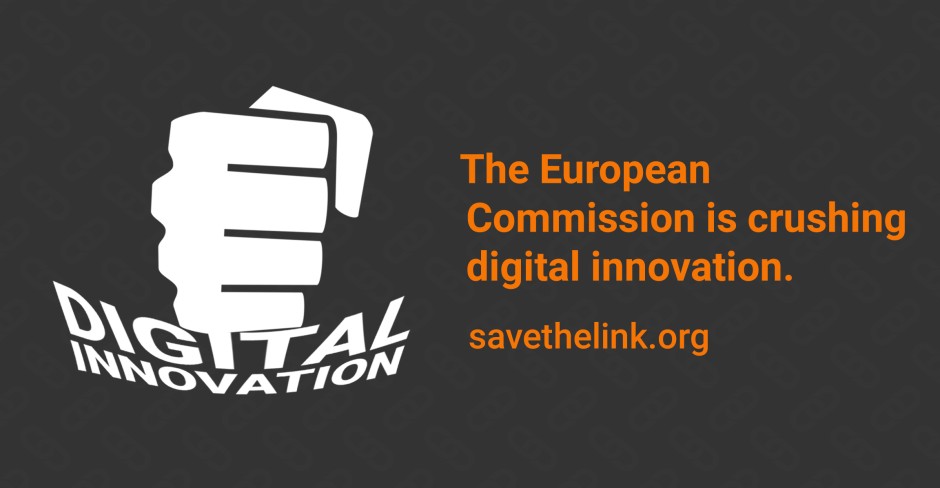The link tax law is leaked, and it looks like it was written by someone who has never used the Internet
A new leak from the European Commission lays out the not-so-specific details of the link tax law and other copyright reforms. And guess what? They only serve media industry giants.
After last week’s leak of the Impact Assessment, today brings a new leak of the entire copyright law, from digital issues blog IPKat. This second leak comes just three weeks before the draft law itself is due to be officially released.
It confirms the worst news: The Link Tax Still Lives. In fact, if it’s possible, the Commission has managed to make things even worse than we anticipated, given last week’s Impact Assessment.
This draft law, now officially named “the Copyright Directive on the Digital Single Market,” is a sad list of items which serve only the media industry giants; a truly pathetic attempt at a law that could have enabled creativity and communication online. Instead proposal after proposal is an idea that we know came directly from lobbyists, and what’s more, are drafted with such vague terminology as to prevent even the experts from speculating on the full extent of the long-term damage they would inflict.
The good news is that we have built a huge community willing to stand up for our right to link, and there is still time to challenge this and make changes.
This is an opportunity to fight back. We’ll keep pushing the Commission to release the full responses to the consultation, and we will demand the evidence. We can also call MEPs to account – they need to know that this law, as written, is an unworkable disaster and we will be watching carefully to make sure they shoot it down in the European Parliament.
What exactly is being proposed?
It’s early yet to do a full analysis given that what the Commission has published does not give many details. In fact it is embarrassingly brief, barely a few sentences. It introduces a “right for publishers” for the “online uses [reproduction and marking available] of their news publications”: aka, the link tax. These ‘online uses’ refers to the sharing of news content across the Web.
It is appalling how small the explanation of these hugely disastrous proposal is. There are no safeguards, no clarification of who is paying the fees or exactly what types of content and link sharing would be affected. For example, there is no limit on the need for permission to link for just search engines or aggregators. Instead, this would target all link sharing, all users of the Internet. Put bluntly, if you communicate online, this proposal affects you.
This is one of the worst fears we had when we formed the Save the Link campaign. Dr Till Kreutzer, of the Initiative Against Ancillary Copyright, sums it up quite nicely: It could not be worse.
The Impact Assessment leaked last week admitted that the link tax was a complete failure in Germany and Spain, but gave the excuse that this was due to “legal uncertainty.”
Yet, laughably, there so many more unanswered questions in this version of the law than in both Spain and Germany’s iterations, that the legal uncertainty would be crushing for online platforms and Internet users.
Take Dr. Till Kreutzer’s view:
“All the safeguards that were tried in Germany and Spain to keep the danger of such a right for the Internet at bay are neglected: The right is not restricted to the making available right but includes also the reproduction right. It is not restricted to certain users like aggregators or search engines, there is no snippet exception like in Germany and it is a full exclusive right not only a levy like in Spain.”
Shockingly the Commission also wish to give the link tax a lifetime of 20 years– that’s 20 years for an ephemeral snippet of text, a few sentences that lose any value in days. This will make it incredibly hard for anyone trying to do research or archive old news stories.
The Commission are not only trying to attach fees to links: it’s part of a whole package that is about controlling how we use the Internet and share and generate content and culture online. They are also demanding that websites negotiate licenses with rightsholders for their content – with no explanation for what this looks like or how it should be undertaken – and implement filtering and monitoring technologies for user generated content.
If this law passes, the Internet will become increasingly fragmented, and our ability to support diverse creators, access undiscovered news sources, hear about global research, and express ourselves freely will be lost.
You can help us make sure it ends here: Join our campaign and nearly 100,000 Internet users to say no to censoring hyperlinks.
We need as many people as possible on board to win this fight in the coming months, so please share our campaign on Twitter and on Facebook.


 Take action now!
Take action now!
 Sign up to be in the loop
Sign up to be in the loop
 Donate to support our work
Donate to support our work